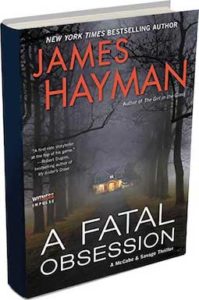The Purpose and Future of Fiction
Sunday, March 31st, 2013James Hayman: There have been many dire predictions over the past few years that what we do and enjoy as writers and readers is doomed both as entertainment and art. The arguments are simple. Today, as never before, the competition for attracting interested customers, or as we used to call it when I was in the advertising business on Madison Avenue, for share of eyeballs is fierce. They competitors are obvious and omnipresent. TV. Movies. Music. Trolling the Internet. Finding “friends” and communicating with them on Facebook and other social media. Video games. Online gaming. Texting. Sexting. There are probably others I haven’t thought of. And, no doubt, there will be even more to come that nobody else has yet thought of either.
With all of these competitors and distractions, there is certainly legitimate reason to ask how many among us will continue to devote ten to fifteen solid hours to sitting and reading a novel either for simple entertainment or in appreciation of literary art.
I think there is hope. The enormous popularity among young people, of the Harry Potter books and more recently the Hunger Games Trilogy, gives me hope for the survival of a class of people willing and eager to spend hours alone reading a novel rather than watching movies or sports or slaughtering realistic cartoon characters in violent video games.
I think people will continue to read the crime novels that we, the “Maine Crime Writers,” create as well as other genre and literary fiction. My reasoning is simple. Fiction in all its forms offers us something none of those other things can match.
To put it simply, fiction uniquely allows us, both as readers and as writers, to enter into, share and explore the interior life of other human beings. Both the characters in the book. And the creator of those characters. “The deepest purpose of reading and writing fiction,” novelist Jonathan Franzen argues, “is to sustain a sense of connectedness, to resist existential loneliness.” Characters that are well drawn offer readers insights into themselves and to other human beings whose thoughts and feelings are usually as real and intimate as the author can make them. Writers who write well offer eaders similar insights into themselves.
As a writer of fiction, the physically solitary act of creating a character, allows me to explore as deeply as I know how, the inner lives of other people. The the feelings, emotions and attitudes of the characters I create are of course bent by passing through the prism of my own attitudes and emotions. But this in no way negates the connectedness Franzen was writing about. It adds to it.
Both writing and reading fiction are voyeuristic exercises. We peer into the lives of others. But unlike the voyeur who eavesdrops on a conversation or reads someone else’s mail or illicitly peers through a window, the writer and reader of a well-imagined and well-crafted novel get to share the deepest emotions and thoughts of the characters. They come to know and understand them in a way that it is difficult to match in real life where even those closest to us create emotional barriers and try to reveal only what they want us to know about them.
The removal of those barriers allows the sense of connectedness Franzen was talking about.
But, some may ask, how real can the connectedness be when the characters are made up. When the characters aren’t real.
The simple answer is that they are real.
McCabe is to some extent the real me. So is Maggie and the other characters in my books, both male and female, adult and child. But in the act of creating them, in the process of giving them thoughts and feelings, of putting them in conflict and often in dire straits, the characters often take over and take on lives of their own.
I’ve written before that perhaps the most difficult and interesting character for me to create in the three books I’ve written so far was Abby Quinn the young schizophrenic woman in The Chill of Night. In creating Abby I spent a lot of time reading and thinking about schizophrenia. I read a number of memoirs written by schizophrenics about their own interior lives. I began to understand what its like to suffer this terrible disease. Then when I put Abby in extreme circumstances of witnessing a murder and then being pursued by the murderer, my understanding of who she was and how she would react became much deeper. I believe readers of the book begin to share that understanding and develop a deeper sympathy and empathy for someone like Abby. That kind of understanding and empathy is what Franzen was talking about when he said, “The deepest purpose of reading and writing fiction is to sustain a sense of connectedness, to resist existential loneliness.”

